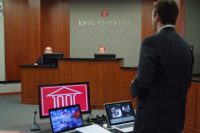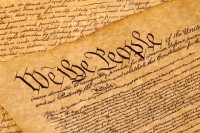
As published by CNBC
In the highly competitive world of judicial clerkships, The John Marshall Law School’s unique approach to legal writing, professionalism training and lawyering skills has made its students stand out candidates. Last year, 14 students landed prestigious judicial clerkships, including five in federal courts and nine in state courts.
Current and former John Marshall students credit the law school’s Career Services Office and the Office of Professionalism & Career Strategy for helping them locate opportunities and master the skills needed to become successful clerks in state and federal courts. In addition to its already expansive lineup of career preparation programming, John Marshall has created professional development programs for its students so they are practice-ready and professional from day one.
“John Marshall does a great job of preparing its students for judicial clerkships. With our strong legal writing program, judicial externship offerings, strategic career advising, and professionalism and career programming, the school provides students with tools that enable them to succeed in these highly coveted positions,” said Chanté Spann, John Marshall’s Assistant Dean for Career Services.
John Marshall graduate Ben O’Connor used those tools to obtain a prestigious clerkship with Seventh U.S. Circuit Court of Appeals Judge William J. Bauer. O’Connor, who was able to parlay an introduction to the judge into a full-time clerkship this year, said he was comfortable seizing the opportunity because of the career and professionalism counseling he received at John Marshall. “At John Marshall there is a real emphasis on being able to sell what you are able to do,” said O’Connor (’15).
The school’s U.S. News & World Report top-ranked legal writing program gave him the writing skills needed to succeed as a judicial clerk. “My judge has been a judge for 40 years, and he makes a point of getting to the heart of what is important. And John Marshall taught me that – how to get to the heart of what is important,” O’Connor said.
Gary Scribner (’15) also credits the school’s professionalism training with helping him obtain a clerkship with Judge James P. Flannery, Jr, the presiding judge of Cook County Circuit Court’s Law Division. He used all of the law school’s career and professionalism resources, including the networking skills he learned, to seek out the opportunity to clerk for Flannery when a vacancy arose. “John Marshall prepared me to be proactive. In the modern job market, no one tells you exactly what to do,” said Scribner. “It’s similar to law school, professors assign you the materials and tell you where the class is going but in order to do well, students must take it upon themselves to take it to the next level.”
John Marshall’s externship program also has been instrumental in helping students get clerkships. Every John Marshall law student is required to participate in at least 168 hours of experiential learning, either through an externship or through a clinical program.
Graduates like Christina Faklis (’13), who externed for a federal judge, say the opportunity was instrumental in helping them obtain and succeed in their clerkships.
Faklis, a former extern for US District Court Judge Charles P. Kocoras of the Northern District of Illinois, says the law school’s Office of Professionalism and Career Strategy helped make the introduction to the judge and she then parlayed it into a three-semester externship and, then, a full-time clerkship. “John Marshall’s legal writing program gave me the confidence as an extern and later as a judicial clerk to draft legal opinions,” said Faklis, now an associate with the Chicago law firm Gozdecki, Del Giudice, Americus, Farkas & Brocato.
Former Illinois Appellate Court Justice Margaret Frossard (retired), now Associate Dean for Professionalism & Career Strategy at John Marshall said the high quality of the students she hired as externs when she was on the bench attracted her to join the administration at John Marshall. “Since serving as the Associate Dean of Professionalism & Career Strategy, I have been able to help these students to continue to make inroads into judicial clerkships because I know, firsthand, the types of candidates that judges seek for these prestigious positions,” said Frossard.


